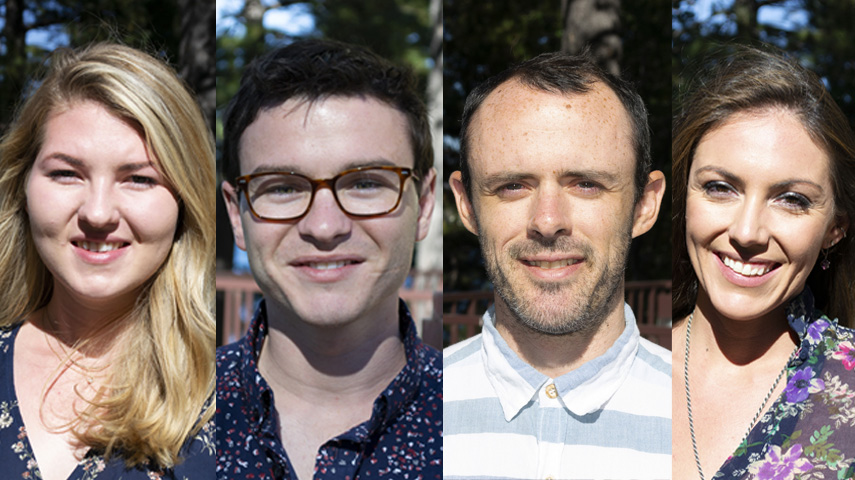BioSci Graduate Students Honored with Prominent Research Fellowships
Awards from the National Science Foundation and Department of Defense support academic excellence in STEM fields
May 20, 2020
By Mario Aguilera, National Science Foundation and Department of Defense

Megan Hayes, Matthew Maxwell, Gabriel Mullin-Manzanarez and Alexandria Palaferri Schieber
Four graduate students in UC San Diego’s Division of Biological Sciences have been awarded prestigious 2020 National Science Foundation (NSF) Graduate Research Fellowships, along with four honorable mentions. One graduate student has been awarded the highly competitive National Defense Science and Engineering Graduate (NDSEG) Fellowship.
Megan Hayes (Cressida Madigan’s lab), Matthew Maxwell (Diana Hargreaves’ lab, Salk Institute for Biological Studies), Gabriel Mullin-Manzanarez (Terry Hwa’s lab; also the recipient of a 2020 National Defense Science and Engineering Graduate Fellowship Award from the U.S. Department of Defense) and Alexandria Palaferri Schieber (Janelle Ayres’ lab, Salk) are among 2,076 NSF GRFP fellowship winners this year.
The NSF Graduate Research Fellowship Program (GRFP) selects high-potential, early-career scientists and engineers, and supports their graduate research training in science, technology, engineering and mathematics (STEM) fields. The oldest graduate fellowship of its kind, GRFP provides three years of financial support, including a $34,000 annual stipend and $12,000 cost-of-education allowance for tuition and fees. The funding supports graduate studies that lead to a research-based advanced degree in a STEM field.
Honorable mentions from Biological Sciences include: Peter Berube (first-year rotation student), Adam Conn (Sonya Neal’s lab), Estelle Kim (Xin Sun’s lab) and Sumedha Ravishankar (Cressida Madigan’s lab).
Several Biological Sciences undergraduates and undergraduate alumni received 2020 GRFP awards. They include: Travis Fleming (a Biochemistry and Cell Biology major who worked in Amro Hamdoun’s lab at Scripps Institution of Oceanography), Wei Elizabeth Gordon (a General Biology, Magna Cum Laude graduate who also worked with Amro Hamdoun at Scripps) and Sherry Zheng (a Molecular Biology and Music major and senior honors thesis student working in Andrew Chisholm’s lab). Alumni who received honorable mentions include Desiree Chu (a Cognitive Science – Neuroscience, Magna Cum Laude graduate who worked in Edward Callaway’s lab at Salk), Lillian Rose (a Physiology and Neuroscience graduate who worked in Gentry Patrick’s lab) and Yuanhao Qu (a Biochemistry and Cell Biology, Cum Laude graduate who worked in Weg Ongkeko’s lab in the Department of Surgery).
According to the NSF, GRFP Fellows are anticipated to become knowledge experts who can contribute significantly to research, teaching and innovations in science and engineering.
“These individuals are crucial to maintaining and advancing the nation’s technological infrastructure and national security as well as contributing to the economic well-being of society at large,” the NSF noted about the award.
Since 1952, the NSF has funded more than 50,000 Graduate Research Fellowships out of more than 500,000 applicants. Currently, 42 Fellows have gone on to become Nobel laureates, and more than 450 have become members of the National Academy of Sciences. The Graduate Research Fellowship Program has a high rate of doctorate degree completion, with more than 70 percent of students completing their doctorates within 11 years.
The National Defense Science and Engineering Graduate (NDSEG) Fellowship awarded to Mullin-Manzanarez is a highly competitive fellowship, with 200 awardees selected out of 4,176 applicants this year. The fellowship recognizes academic excellence in STEM. The NDSEG Fellowship Program was established in 1989 by direction of Congress to support the training of scientists and engineers in a broad range of disciplines with an emphasis on research of interest to the Department of Defense. The NDSEG fellowship provides full tuition and all mandatory fees for up to 36 months for graduate studies at any accredited U.S. college or university. In addition, awardees receive a monthly stipend of $3,200 and a travel budget.
